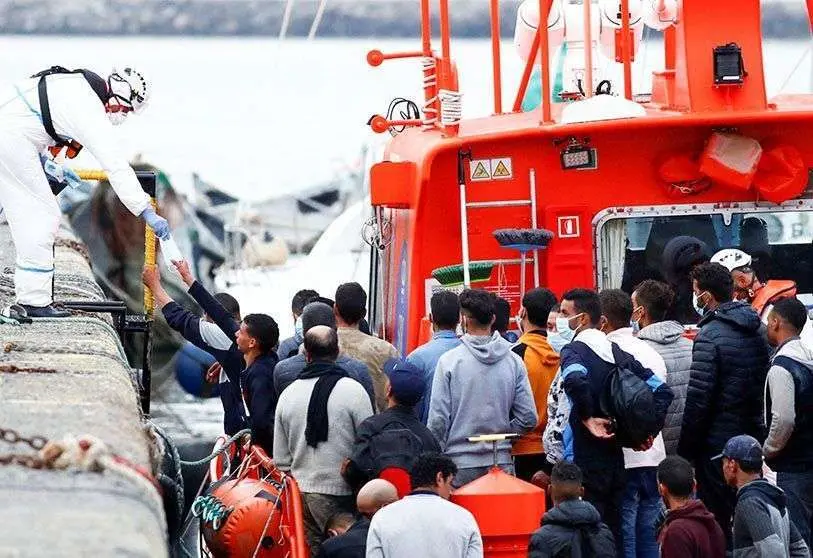Migration policies (from Lanzarote to Lesbos)

As the summer of 2020 draws to a close, we would like to summarise the migration policy issues (in the Spanish and European spheres) that have received media attention over the last three months. The summer opened with the dissemination of the relaunch plan promoted by the European institutions to tackle the health and economic consequences caused by the COVID-19. As soon as the main lines of the plan were made public, the lack of a migration policy assumed by the European Union as a whole was pointed out. The temporary relief in the arrival of refugees and immigrants that the closure of the borders during the spring meant, once again, contributed to overlooking the importance of migratory issues on the European agenda and to once again postponing a concrete proposal for a shared strategy in the medium term.
At national level, two events related to migration made the headlines at the end of June. On the one hand, United We Can brought to Congress a non-binding proposal that called for the urgent and massive regularization of immigrants living in Spain; the proposal did not have the support of the Socialist Party, and had already been a source of disagreement within the coalition government. After her presentation, the minister spokesperson, María Jesús Montero, made it clear that the measure was not going to be supported by the government, making explicit the division of the executive branch on this issue.
On the other hand, it was made public during the same days that the government had been working for weeks to improve the coordination of the three ministries responsible for migration issues (Foreign Affairs, Interior and Inclusion, Social Security and Migration), with the aim of being better prepared when the borders were reopened, as well as to strengthen migration policy in several areas that were considered critical. It should be remembered that during the months when the borders were closed the arrival of boats across the Mediterranean dropped dramatically and only arrivals in the Canary Islands continued, albeit less frequently.
With the reopening of the borders, the arrival of boats across the Mediterranean and the Atlantic increased again. The Secretariat of Migration drew up a protocol (which came into force on 25 July) to establish the measures to be taken with migrants arriving on these boats: the autonomous communities were to be responsible for carrying out PCR tests on all those disembarked, as well as reserving spaces so that those who tested positive and their contacts could keep the obligatory quarantine. This protocol caused discrepancies between several of the autonomous communities affected (Murcia, Andalusia and the Canary Islands) and the Ministry of Inclusion, Social Security and Migration.
In the specific case of Andalusia, the regulations of this community prescribed the performance of rapid tests (and only PCR tests for those who tested positive in them), and only care and quarantine for those who required hospitalisation. The problem with this discrepancy was that the Secretary of Migrations only allowed migrants to access accommodation if they showed a negative RCP; therefore, we found migrants considered by the Andalusian government as negative cases and as unconfirmed cases by Migrations (and, therefore, without the possibility of being accepted in accommodation).
Back in Europe, the summer closes with two events that once again highlight Europe's contradictions in migration issues: the news of the fire at the Moria refugee camp in Lesbos and the announcement of the presentation of the EU's long-awaited migration plan for 23 September. The situation of the Moria refugee camp, the largest in EU territory, had already been the subject of attention even before the health crisis. The repeated requests from various international organisations for this camp to be evacuated as a matter of urgency have been to no avail.
As for the migration plan, its head, Ylva Johansson (the EU's interior commissioner), has already pointed out the difficulty of reaching agreement between member states on the most conflictive migration issues, such as the distribution of migrants between the twenty-seven states. Work is underway on a consensus document that will partially satisfy the interests of all countries, although not fully those of any. We look forward to the concrete content of the plan in the coming days.
The impression left by this information on migration policy is not positive: news from the national level shows the lack of coordination and the differences in criteria between the different administrations; those from the European level reveal the relative importance that the European institutions give to the subject (despite its decisive weight in the economic and demographic future of the continent), as well as the enormous differences that exist between the EU Member States in terms of establishing a common policy that is accepted by all. Two emblematic names in European literature, Lanzarote (with the increase in migratory flows from the western coasts of Africa: Morocco, Mauritania, Senegal and Gambia) and Lesbos (with the Moria refugee camp), provide a temporal, geographical and symbolic framework for the summer that is ending.
Luis Guerra, Professor of Spanish Language at the European University of Madrid, is one of the main researchers of the INMIGRA3-CM project, financed by the Community of Madrid and the European Social Fund


